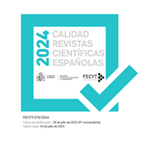Bases para la fundamentación teórica de la neología y el neologismo: la memoria, la atención y la categorización
Resumen
La neología posee actualmente un importante desarrollo práctico, pero las reflexiones teóricas no han sido revisadas desde los estudios tradicionales; nuestro objetivo es aportar nuevos datos sobre su concepción teórica partiendo de la perspectiva de la Lingüística Cognitiva. Una vez establecida la vinculación entre el lenguaje y las facultades cognitivas (atención, memoria, categorización), concluimos que la categoría neológica puede estructurarse en términos de efectos prototípicos y que sus elementos se distribuyen de manera flexible en un continuo que refleja distinciones; además, se demuestra que los neologismos son entidades subjetivas y relativas, figuras automáticas que destacan sobre el fondo discursivo en el proceso atencional debido a la sorpresa que generan, y que el criterio psicológico es el método natural para reconocerlos. La reflexión teórica permite formular unos axiomas que deben considerarse en los estudios neológicos y dividir el proceso de comprensión de cualquier neologismo en tres etapas: reconocimiento, interpretación y comprobación.
Descargas
Descarga artículo
Licencia
La revista Círculo de Lingüística Aplicada a la Comunicación, para fomentar el intercambio global del conocimiento, facilita el acceso sin restricciones a sus contenidos desde el momento de su publicación en la presente edición electrónica, y por eso es una revista de acceso abierto. Los originales publicados en esta revista son propiedad de la Universidad Complutense de Madrid y es obligatorio citar su procedencia en cualquier reproducción total o parcial. Todos los contenidos se distribuyen bajo una licencia de uso y distribución Creative Commons Reconocimiento 4.0 (CC BY 4.0). Esta circunstancia ha de hacerse constar expresamente de esta forma cuando sea necesario. Puede consultar la versión informativa y el texto legal de la licencia.











